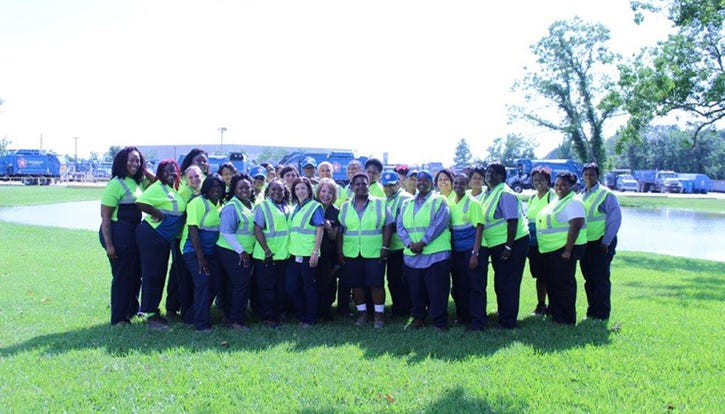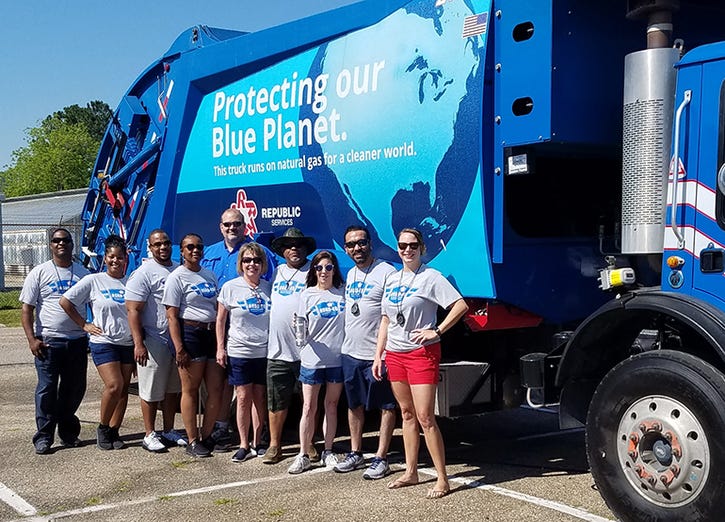Women Leaders in Waste: Sharon Mann of Republic Services
Mann was one of Republic’s first female operations managers and has successfully recruited a diverse pool of CDL drivers for the Baton Rouge, La., area.

For Sharon Mann, dispatch is the heartbeat of a waste hauling operation. Each day, dispatchers dictate the overall workflow of collections and have an enormous impact on customer satisfaction and delivering essential information to drivers and the management team.
Mann has been with Republic Services for the past 32 years. She got her start as a dispatcher while she was in college and later served as a safety manager, human resources (HR) manager and operations manager before settling into her current role as general manager for Baton Rouge, La.
When Mann applied for the operations manager position in Baton Rouge, she recalls that the area manager was shocked because there were no female operations managers in the company at the time. He pulled Mann into his office and had a very long conversation with her about why she wanted this position and if she thought she could handle it.
“I was very confident in being able to do it because I was so familiar with the industry,” explains Mann. “Coming from dispatch, safety and HR, I understood where the company needed to be and what their expectations were of their employees, so I kind of sold myself. He said, ‘OK, I’m going to give you a shot, but I can tell you, it’s going to be tough.’ And I said, ‘OK, well I love a challenge.’ So, he put me in that role, and within about two months, they added another female operations manager on the West Coast. So, there were only two of us for a very long time. I was in that position for at least 10 years.”
Mann was then contacted by Republic’s area president at the time Tim Stuart, who was appointed the company’s chief operating officer in April 2019, and Darrell Reno, who was the regional vice president at the time. They asked her to travel through the eastern region and provide guidance to locations that needed it.
“I did that for about a year, and I enjoyed working with different locations a lot,” she says. “And I really felt like that helped me grow in my current role. Some of the challenges we had in Baton Rouge were the same in other areas. They had some good ideas, and I brought them good ideas, so I thought that was rewarding. Tim Stuart is a very important person in my life who has given me a chance on a lot of different things and has had a lot of confidence in me. He offered me this position here. Ultimately, my goal was to eventually get this position, and here I am today.”
Baton Rouge Operations
In Baton Rouge, Republic has roughly 300 employees between its hauling operation and recycling plant. In the area, Republic serves residential, municipal and industrial customers and has about 140 routes a day.
“We touch a lot of people during the day. I can’t drive from my house to the office without seeing at least six to seven blue trucks every day,” notes Mann. “Our brand here is very strong. A lot of people know Republic, and they expect a lot from Republic.”
Her previous experience as an operations manager helped Mann understand the importance of day-to-day customer service and how important it is that customers understand how much the company cares about them.
“I’ve always told people that the best day is when a customer doesn’t have to call you because the last thing that they need to be worried about is their garbage. That’s what they have us for,” explains Mann. “We only want customers to call us for new business or something positive; we don’t ever want anyone calling us to tell us they have a problem.”
And that mentality is something she instills in the area’s supervisors and management team. Mann also is a firm believer of promoting people from within the company and promoting other women into management positions.
“I really, really enjoy coaching, mentoring and training,” she says. “I feel it's my job to promote from within because people have done that for me. I need to make sure that I help people grow within the company because when someone joins our company, most people don’t just want to do what they got hired to do; they want to do more. It’s our job as general managers, operations managers, HR managers or whoever you are to help people get promoted and guide them through so they can excel within the company. That’s one of the things I am really proud of, and I will continue to do that until I retire.”
Recruiting Drivers: Thinking Outside the Box
Throughout Mann’s career, recruiting drivers has been an ongoing challenge. She had a particularly difficult time finding drivers when she was an HR manager. During that time, as much as Republic would advertise and try to find people, it was hard to find commercial drivers who wanted to haul trash when they could go over the road or find a job that didn’t start so early in the morning.
One day, Mann picked up her son from school for a doctor’s appointment. As she waited for him in the parking lot, she noticed all the bus drivers sitting outside and talking. And it hit her: they had their commercial driver’s license (CDL). So, while she waited for her son, she began talking to the bus drivers and handing out her business card.
“One thing that really caught my eye about them is that they are carrying precious cargo. We’re allowing our children to get on the bus with someone we don’t know. So, we entrust them to be safe every day,” she points out. “They have to operate safely. And they go in the exact same neighborhoods that we go in every single day—actually, they go in twice a day when we might only go once or twice a week. I was very interested in that, and then I started thinking about dump truck and cement drivers who are experienced with different weight variances.”
Mann also met with some area women’s groups to recruit drivers, and people began applying. At first, she hired four or five drivers, but she got some pushback from her supervisors, who, at the time, feared the new recruits didn’t have enough experience or would take too long to train.
Ultimately, the school bus drivers took slightly longer to train, but they ended up loving the job and started recruiting themselves. Before she knew it, Mann had 10, then 20 and now she has more than 60 drivers.
“I was very challenged with my supervising team at the time because they never managed female drivers,” she says. “I had to do some training with them, so they understood that you’re still dealing with the employee. People are people. Personalities are different, but you still manage the individual person through the processes like you would do with anybody else. So, we did have a little bit of a challenge with that, but we’ve overcome that. Now, my supervisors and managers tell me that when they go places, they are asked the question, ‘What’s it like working for a female general manager?’ and they respond, ‘What’s it like working for a male because we’ve never worked for anybody but a female?’ So, I think it’s all in what you’re used to and all in how you’re trained.”
Plus, support is key, notes Mann.

With a growing labor shortage across the industry, Mann believes that the industry as whole needs to start thinking outside the box when it comes to recruiting. She says many of her peers in management have expressed concerns about whether school bus drivers, for instance, could handle waste collection, the hours of operation, weight variance or driving to a landfill.
“You’ve just got to go out there and take a chance because the shortage is there, and it’s very real,” she explains. “I don’t see it getting any better with the way employment is right now. The economy is wonderful right now, so we are really going to have to think outside of the box and take chances on people (or jobs) that we may not have thought about before.”
“Nobody comes to any job fully trained on the business they are hired into,” she adds. “They come with experience and you have to feed on that, and you have to give them that training. We, as an industry, have to accept that instead of just turning our heads and saying 'that’s not going to work,' because it does work. I have almost more female drivers than I have male. We’ve got to make sure that we at least take that chance, and I really think that people are leery about taking the chance.”
Consistency When Disaster Strikes
In 2016, a flood hit Baton Rouge and impacted 60 of Mann’s employees and almost half of the city. Not only did Mann’s employees lose everything they had at the time, but she lost her house and her husband lost his business.
Although rebuilding her home was painful and emotional for her, Mann showed up to work for her team. And when her employees affected by the disaster came back to work, they told her they were glad to be back. “This is the only place we feel normal,” they said.
“When I heard that from them, I really wanted to make sure that we could be as normal as we could every single day because we knew there was a long road ahead of us. It took at least a year to recover from that, and some people are still challenged with it,” explains Mann.
“Our team showed up to work every day, even though they didn’t have a place to live and were staying with family and friends,” she adds. “That still gives me a lump in my throat to know the passion that they had to come back to work and to show up, as hard as it was, so I wanted to make sure that they felt as normal as they could. I didn’t know it, but the company recognized that and gave me the Firefighter Award that year. It really, really meant a lot to me.”
In addition to the Firefighter Award, in 2018, the city of Baton Rouge gave Republic the Diversity Star Award for taking a chance on a diverse pool of new recruits.
Republic Baton Rouge also received the Louisiana Clean Fuels Champion Award for operating the largest compressed natural gas fleet in the state of Louisiana.

Overcoming Challenges
As a woman in a male-dominated industry, Mann has never felt uncomfortable or out of place at Republic. But in the industry as a whole, she still sees being accepted as a woman in a leadership role as a challenge.
But in her day-to-day work, Mann’s biggest ongoing challenge is making sure her team remains fully engaged.
“Engagement is a big piece of what we do every day. If you don’t do a good job with that, it’s going to be very difficult to be successful,” she says. “At the end of the day, if you’ve got an engaged team and you give them the tools that they need to perform, it will be difficult for you not to be successful.”
When it comes to staying motivated, Mann credits her team at Republic and her family.
“I love what I do. I am like the Energizer Bunny. I love coming to work,” she says. “My husband is a huge supporter. I got married here and had kids here, and they think the way I work is normal. You’ve got to have a huge support team at home. And coming to work every day, I am just rewarded by people telling me how much they love their job and that they want to do more.”
She also is able to stay motivated and overcome any challenge that may arise because of the support she receives from Republic’s corporate office and her area staff.
“The support is probably one of the things that keeps me going every day because I know that I’ve got people who have my back and the people here know that I have theirs,” says Mann.
As we continue this series, we invite our readers to email Waste360 Editorial Director Mallory Szczepanski at [email protected] with suggestions of women to feature in the coming months.
About the Author
You May Also Like




.png?width=300&auto=webp&quality=80&disable=upscale)